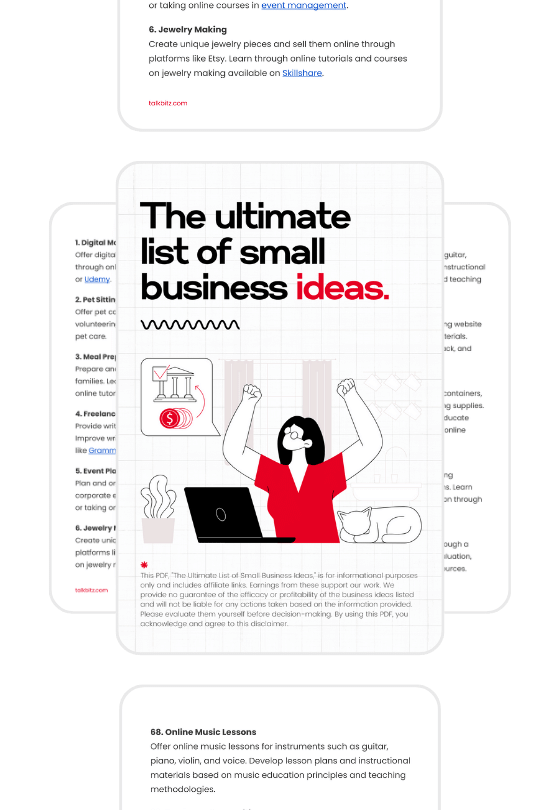Are you one of those who say, “I want to start a business but have no Ideas”?
You’re definitely not alone in that boat.
The struggle is real for many people.
But don’t give up just yet!
I was once right where you are now, but then I found my passion for all things marketing and turned it into a business adventure filled with content.
Even if creating content isn’t your thing, no need to worry.
I have some practical tips on how to find the perfect business idea that aligns with your passion, skills, and experience – and yes, even how to start a small business with no money.
So grab a cup of coffee and let’s get started!
Key Takeaways
- Take some time to identify your strengths and weaknesses. Consider your hobbies, interests, and skills. 1
- Use platforms like Skillshare to develop your skills further. 3
- Do some market research to get a sense of the demand for your business idea. 4
- It’s also a good idea to seek inspiration from different sources, like podcasts, and be open to testing out new ideas. 5
- Once you’ve got a solid plan, start looking into funding options and work on developing a strong business plan. 7
Disclosure: Our website is reader-supported. If you purchase any product through our partner links, we may earn a commission at no extra cost to you.
Why Most People Don’t Start Their Own Business?
A recent survey gave us some pretty interesting insights. It turns out that 42% of Americans have thought about starting a business at some point.
But when it comes down to hitting the start button, they often hold back for different reasons.
The most common barriers reported include not having enough money, and feeling unsure about what type of business to start.
But when we look closer, there are even more things holding people back from starting their own business:
- Around 43.58% feel like their lack of money is holding them back.
- Nearly 15.76% are unsure about what type of business to start.
- Another group (about 15.66%) has no interest.
- Then there’s a group, around 12.94%, that struggles to find time
- Others already have their hands full with another business they’re running (around 12.06%).
It seems like many people face some challenges before taking that big step forward – so, here are some suggestions and tips that can help you overcome these barriers and get started.
1. Understand Your Strengths and Weaknesses
Starting a business can be super exciting, but I totally get it if you’re feeling stuck without any ideas. The first step is to take some time to really understand your strengths and weaknesses.
What are you good at? What do people always come to you for help with?
And what are the things that you might struggle with?

Identifying these areas can help you figure out the best direction for your business.
Plus, it’s totally okay to have weaknesses – we all do!
Understanding them can guide you on where you might need extra support or skills.
So take out a pen and paper (or open up a new doc) and make two lists: one for strengths and another for weaknesses. It’s a great way to get a clear picture of where you shine and what areas you may want to work on.
2. List Your Hobbies and Interests
What are those activities that light up your day and bring you joy?
Start listing down all those hobbies, interests, and activities that really light you up.
Whether it’s baking, hiking, photography, or even gaming – anything goes here, jot them all down.
Sometimes the best business ideas come from doing what you love.
Ready to turn your passion into profit?
Learn how to start a Shopify store and make money doing what you love.
These are golden nuggets for sparking ideas and laying the groundwork for your entrepreneurial journey.
And yes, seeking feedback from others or industry experts can also provide valuable insights; don’t hesitate to reach out for an outside perspective.
We shouldn’t forget platforms like Reddit and Quora which are full of discussions on just about anything – they might just trigger that “aha” moment!
3. Evaluate Your Skills, Knowledge, and Experience
Now, let’s take a good look at what you bring to the table.
Your skills, knowledge, and experiences are hidden treasures just waiting to be discovered for business ideas.
Think about everything from what you’ve learned through school or work experiences, any new skills in your pipeline, and even those hobbies that light up your day.

On the other side, think about areas where you might need some extra support or skills development.
Consider how these abilities could be transformed into successful business ideas – sometimes the best ideas are right under our noses!
And most importantly, if you want to expand your skill set (who doesn’t?), platforms like Skillshare offer tons of online courses just waiting for eager learners like yourself!
4. Conduct Market Research
Once you’ve got your list of small business ideas, it’s time to put on your detective hat!
Start by doing market research and scoping out existing businesses and industries.
Dig deep into understanding your target audience, take a look at what your competitors are doing, and keep an eye on industry trends – they can tell you a lot about what people want these days.

Here are some handy tools that’ll make this whole process way easier:
- Google Trends: This will give you insight into popular search terms.
- Jotform: It can design visually engaging surveys and forms.
- Statista: Provides statistical data plus valuable market insights.
- Semrush: Offers SEO analysis and keyword research.
- Think With Google Research Tools: A great resource exploring consumer behavior and current market trends.
And if you’re feeling overwhelmed by all of this (which is completely normal), HubSpot offers a free Market Research Kit with handy templates plus a guide to help you navigate through market research smoothly. Give it a try.
5. Seek Inspiration from Various Sources
When it comes to starting a business and feeling stuck with no ideas, seeking inspiration from various sources can be incredibly helpful.
Read books, talk to others in the entrepreneurial community, and listen to podcasts that focus on entrepreneurs – this will help you generate fresh business ideas as well as provide much-needed inspiration.
Don’t forget about the interviews on YouTube featuring successful business owners; take advantage of them!
Hearing their stories can spark new thoughts and motivate you on your own journey.
Soak up all the knowledge and creativity around you – who knows what kind of amazing idea might come knocking at your door?
6. Test Your New Business Idea
After outlining all the potential concepts from your brainstorming session, it’s time to take the next steps.
Start by building a minimum viable product (MVP) – this is just a basic version of your product or service that you can put out there and test with potential customers.

It’ll give you valuable insights into whether there’s actually demand for what you’re offering.
Once that’s done, run it by a group of people who can provide honest feedback – think friends, family members, and even industry experts if possible.
Take their input onboard and use it to tweak and refine your MVP based on how well it resonates with them.
However, not every business idea necessarily needs an MVP; if yours revolves around services rather than products, consider simply trying out your offerings with a small customer base instead.
Also Read: 20 Best Part-Time Evening Jobs for Hustlers
7. Find Money to Start Your Business
You already know that feeling when you’re bursting with passion to start your own business, but the big question mark looms over your head: “Where do I get the money?.”
You already know, as I mentioned earlier, that a lot of people feel like their lack of money is holding them back from starting a business.
To tackle this challenge head-on, I think it’s crucial to first look at your own financial situation before seeking other funding options.
When asking for financial support from others such as family and friends or lenders — make sure to present them with a solid business plan so they understand where their investment is going.
And if numbers aren’t really your jam – seeking advice from someone experienced in this area wouldn’t hurt either!
Plus, in today’s internet and AI-driven world, there are businesses you can start even without any money.
Service-based businesses such as virtual assistants and freelance writing are great examples of this.
As you gain experience and build your portfolio, you can expand your reach and increase your rates.
And the best part? Freelance sites like Fiverr and Upwork make it easy to get started!
Additionally, low-cost options such as dropshipping, print-on-demand services, and selling digital products are also good choices for those looking to start a business on a budget.
It’s definitely worth exploring these options further – don’t you think?
8. Launch and Grow Your Business
Now you’re at the exciting stage of launching and growing your business!
Creating a solid business plan will help guide your efforts and keep you on track as you navigate through this exciting journey. Registering your business is an important step towards establishing its legitimacy, while also protecting yourself legally.

When it comes to building an online presence, think of it as setting up shop in the digital world – showcase what makes your brand unique!
And remember, Rome wasn’t built in a day – growing and expanding takes time and effort but boy oh boy does it pay off!
Takeaways
So, if you’re sitting there thinking, “I want to start a business but have no ideas,” take a deep breath and remind yourself that it’s perfectly fine not to have all the answers right now.
It’s okay not to have that million-dollar idea just yet.
And most importantly, it’s absolutely normal to feel lost and overwhelmed at this stage.
Take the time to understand your strengths and weaknesses, explore your hobbies and interests, evaluate your skills, conduct thorough market research, seek inspiration from various sources, test out new ideas, and find ways to fund your venture.
Remember that these suggestions are just stepping stones on which YOU can build something amazing!
Use them as a starting point, but don’t be afraid to keep exploring.
You’ve got this!

